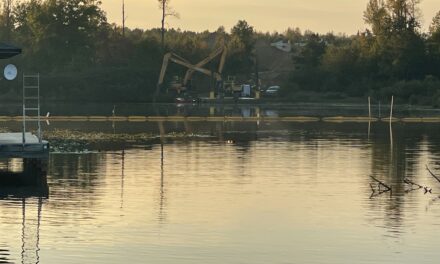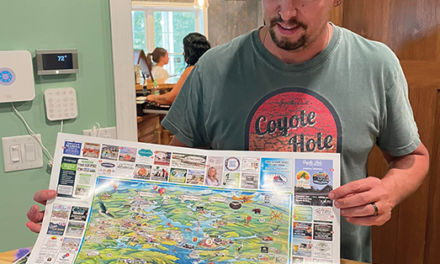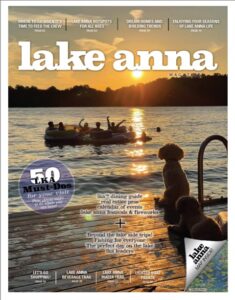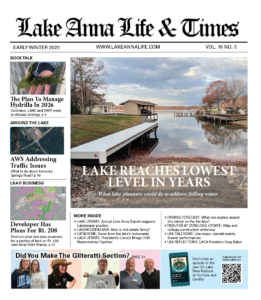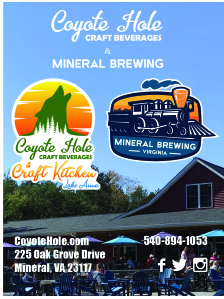Short Term Rental Regulations Divide Louisa BOS and Planning Commission
By Tammy Purcell/Engage Louisa
After grappling with how to regulate short-term rentals for over a year, the Louisa County Board of Supervisors has approved limited rules for the temporary lodging option that pleased many STR owners, but left some residents dissatisfied.
Following more than an hour of public comment, supervisors voted 5-2 to allow short-term rentals by-right in most of the County’s residential neighborhoods while imposing some restrictions on the dwellings.
In adopting the ordinance, the board rejected a recommendation from the Louisa County Planning Commission that would’ve more strictly regulated the rentals by requiring STR owners to obtain a Conditional Use Permit in most zoning designations. CUPs require a public approval process and the County could’ve mandated occupancy limits and septic system maintenance requirements, key concerns for community members who’ve repeatedly urged the County to regulate the use.
Supervisors instead opted for a more lenient approach that places some limitations on STRs but generally allows the burgeoning industry—especially popular around Lake Anna—to continue with business as usual.
Broadly, the adopted ordinance, dubbed the “board workgroup proposal,” allows STRs by-right in residential zoning inside the county’s growth areas, where more than 90 percent of STRs currently operate, as well as in resort development zoning. It requires STRs in those zoning designations to provide contact information to the county, submit records on septic system inspections and repairs, comply with state health department rules, including guidelines for septic systems, and abide by other state safety regulations, among other provisions. But it doesn’t explicitly include an occupancy cap to be enforced by Louisa County or mandate periodic septic system maintenance.
STRs in the county’s agriculturally zoned areas are permitted by-right with no restrictions while rentals in other zoning districts, where few STRs currently exist, require a CUP. County staff recommended the draft’s approval.
Several supervisors suggested that it’s not the county’s job to restrict STR owners’ ability to rent their homes and that many of the issues surrounding the use could be handled in other ways including through private homeowners’ associations and existing county code.
Louisa District Supervisor Eric Purcell drew on his background as a developer in arguing that residents upset about short-term rentals should turn to their development’s HOA and restrictive convenants for help instead of asking the county to enact more rules.
“That provides mechanisms of enforcement that are much more practical than, in my opinion, what the Planning Commission recommended,” Purcell said, before motioning to approve the board workgroup draft.
Aside from Purcell, Jackson District Supervisor Toni Williams, Patrick Henry District Supervisor Fitzgerald Barnes, Mineral District Supervisor Duane Adams, and Green Springs District Supervisor Rachel Jones voted in support of the proposal.
Mountain Road District Supervisor Tommy Barlow and Cuckoo District Supervisor Willie Gentry opposed the regulations, arguing that STRs are a commercial use incompatible with residential zoning and should require a CUP.
“If we pass this thing, I think we are going to be back here again and again trying to fix the problems that are already rearing their heads and came to us in the first place,” Barlow said. “I think we have a responsibility to protect the people who bought in these residential subdivisions expecting a quiet place to live.”
For about 18 months, county officials have been struggled with how to regulate short-term rentals. Though the use is defined in County code—the rental of a dwelling for 30 days or less—it wasn’t otherwise addressed, meaning STRs technically required a CUP. But the County didn’t enforce that rule, leaving the County’s roughly 460 STRs—mostly around the lake—free to operate sans official oversight.
The proliferation of short-term rentals in lakeside neighborhoods sparked controversy and prompted some year-round residents to push for strict regulations. Residents argued at county meetings that STRs are businesses operating in residential neighborhoods that threaten the character of their community, public safety and the long-term health of the lake.
Specifically, they said that overcrowded STRs could lead to failing septic systems that harm the lake’s water quality and urged County officials to adopt a two-person per bedroom occupancy cap—a standard generally in accord with Virginia Department of Health guidelines for septic systems—and septic system maintenance requirements. Residents also complained that unruly renters don’t respect their neighborhoods, throwing large parties, leaving piles of trash and speeding down once-quiet streets, and absentee owners have no interest in addressing their concerns.
But STR operators, realtors and members of the business community pushed back, contending that strictly regulating STRs—especially implementing an occupancy cap and enforcing the requirement for a CUP—would decimate tourism and harm small businesses.
The divided views on how to regulate the rentals were reflected in the pair of proposals up for consideration and in the arguments made by the roughly two dozen community members who weighed in during the public hearing. Many speakers warned against strict regulations, saying that STRs are a vital part of the community and should be embraced. Others argued that it’s county government’s job to ensure that STRs aren’t overcrowded.
“It seems that everyone related to STRs is being vilified even the guests. And, yes, they are guests of Louisa County. They spend millions of dollars a year so that residents can enjoy a better life here. They frequent our restaurants, bars and grocery stores. They rent boats and jet skis, and, as a result, they employ lots of people who can provide for their families. For a moment, let’s all picture the lake with no summer jobs,” said Jackson District resident Marie Snyder. Snyder said that she owns a business entirely dependent on STRs, which employs about 20 people in the summer, and urged the board to adopt the workgroup draft.
Tracy Hale Clark, Executive Director of the Louisa County Chamber of Commerce, also supported the workgroup draft and echoed Snyder on the importance of tourism.
“Our member restaurants, shops, boat rentals, landscapers, cleaning companies, builders, entertainers, breweries and wineries all credit tourism as a key component to their success. In fact, several businesses stated between 50 and 75 percent of their annual revenue is directly impacted by tourism. Some would not exist without it,“ Clark said, citing recently released statistics from the Virginia Tourism Corporation, which show that direct visitor spending in Louisa County rose from $47.4 million in 2016 to over $69 million last year. Clark said that the largest portion of that spending—$23.8 million—was on lodging.
But other speakers pushed for stronger rules especially an occupancy cap.
“My neighborhood has well over 2,000 STR people showing up annually. Do we know these people? No. At the end of the day, I’m not saying no STRs. I am saying there are legal, governing documents that every home has, citizens and STR owners. Those legal governing documents, a certificate of occupancy issued by Louisa County with the number of bedrooms, a VDH permit listed with the number of bedrooms and the gallons per day (for a septic system), should not be discarded,” said Lake Anna resident Valerie Bagby.
Greg Baker, speaking on behalf of the 800-plus members in the Lake Anna Civic Association, an environmental advocacy organization, said that his group doesn’t oppose STRs but supports meaningful restrictions to protect the lake including occupancy limits. He linked the Harmful Algal Blooms that have plagued the upper end of the lake over the last six years—prompting VDH to issue no swim advisories—to overused septic systems.
“We’ve obviously had six years straight of the upper lake being shut down for no swim advisories. That can’t be good for our economy. It can’t be good for the short-term rentals,” Baker said. “Excessive phosphorous and nitrogen cause HABs. Overcapacity of septic systems release phosphorous and nitrogen. A septic system does not need to fail to release excessive phosphorous and nitrogen. In fact, they don’t treat phosphorous and nitrogen. They treat bacteria in E. coli.”
But most board members were unwilling to entertain the idea of an explicit occupancy limit, declining a request from one speaker to reach a compromise proposal.
As passed, the ordinance designates STRs as a commercial use and permits them by-right with some restrictions on property zoned residential (R-1 GAOD, R-2 GAOD) in the county’s designated growth areas, as defined in the 2040 Comprehensive Plan, as well as on property zoned for Resort Development (RD). Most waterfront real estate on Lake Anna is zoned residential and in a growth area. Cutalong at Lake Anna, Spring Creek at Zion Crossroads and several other areas are zoned for resort development. STRs operating in these zoning designations are required to:
– provide a point of contact for their property to Louisa County and its subdivision’s governing body, if applicable;
– provide to tenants a copy of Louisa County code sections pertaining to noise and solid waste as well as the definitions for Special Occasion Facilities and Gatherings as part of short-term rental contracts.
– inform tenants that using the property for a special event typically held at a special occasion facility—a wedding, for example—is prohibited unless the property has a valid Conditional Use Permit;
– provide to Louisa County documentation of septic system inspections and repairs whenever they are completed, if applicable;
– comply with all applicable state health department, building code and safety regulations.
STR owners unable to meet these requirements are prohibited from operating a short-term rental unless they obtain a Conditional Use Permit from the Board of Supervisors.
STRs operating inside or outside of growth areas in industrial (IND, I-1, I-2) and commercial (C-1, C-2) zoning designations require a CUP as do STRs operating in residential zoning designations outside of growth areas. Short-term rentals in agricultural zoning (A-1, A-2) inside or outside a growth area are permitted by-right and not subject to the rules governing STRs on residentially zoned property in growth areas.
The county won’t impose rules on STRs in agricultural zoning to comply with an opinion that Attorney General Jason Miyares published earlier this year. The opinion essentially says that localities can’t use their zoning code to regulate short-term rentals on agricultural land because the use is considered agritourism.
At Williams’ request, the board tweaked several provisions in the workgroup draft including nixing a requirement that STRs provide one parking space per bedroom and space for a trailer, adding a provision that STRs comply with VDH rules and changing the ordinance’s effective date from January 1, 2025 to January 1, 2024.
“It’s going to take 15 months to enforce this? It just doesn’t seem like there’s much there…should we give (people) 15 months to do something that should take a couple days,” Williams said.

